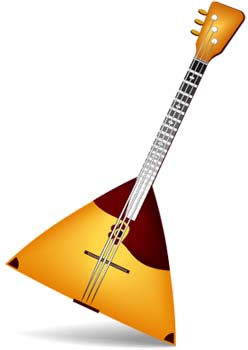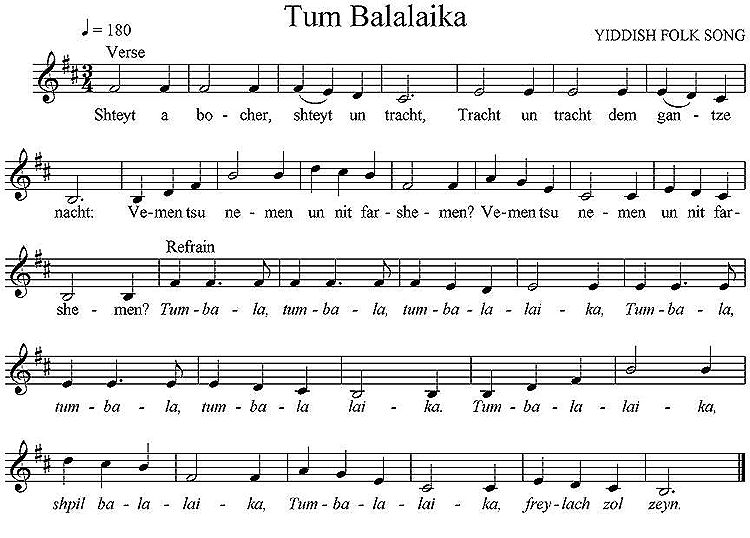טום בללייקה
Tum balalaika
This song is also referred to as "Tumbalalaika". It's a Russian Jewish Folk Song in Yiddish about love.
Tum (טום) means noise in Yiddish. A balalaika (באַלאַלײַקע) is a Russian stringed musical instrument.

טום בללייקה
Tum balalaika
Sound balalaika
Folk Song
Folk Song
(Yiddish)
(English)
Shteyt a bocher, shteyt un tracht,
Tract un tracht dem gantze nacht:
Vemen tsu nemen un nit farshemen?
Vemen tsu nemen un nit farshemen?
Tumbala, tumbala, tum balalaika
Tumbala, tumbala, tum balalaika
Tum balalaika, shpil balalaika
Tum balalaika, freylach zol seyn.
Meydl, meydl, ch'vel bay dir fregn:
Vos kon vaksn, vaksn on regn?
Vos kon brenen un nit oyfhern ?
Vos kon benken, veynen on trern?
Narisher bocher, vos darfstu fregn?
A shteyn kon vaksn, vaksn on regn.
Libe kon brenen, un nit oyfhern.
A harts kon benken, veynen on trern.
A young man stands, stands and ponders
He ponders and ponders all night long:
Whom to choose and not offend?
Whom to choose and not offend?
Sound bala, sound bala, sound balalaika
Sound bala, sound bala, sound balalaika
Sound balalaika, play balalaika
Sound balalaika, be joyful.
Maiden, maiden, can I ask you?
What can grow, grow without rain
What can burn, burn and not stop
What can cry, cry without tears?
Foolish young man, what are you asking?
A stone can grow, grow without rain,
Love can burn, burn and not stop
A heart can cry, cry without tears.
Comments
Dear Mama Lisa:
I was actually looking for a set of lyrics to this I remember from my childhood. I could recall the last two verses but not the first.
If I might dare to suggest an alternate translation to the last two:
Maiden, maiden, this I must know.
What can grow without rain or snow?
What can blaze and never die?
And what can weep and never cry?
Tumbala tumbala tum balalaika
Tumbala tumbala tum balalaika
Tum balalaika, play balalaika
Tum balalaika laugh and be gay.
Idle lad you're joking I know.
A stone can grow without rain or snow.
Love can blaze and never die
And a heart can weep and never cry.
Chorus.
Sorry, it's just a more singable version in English. I used to use it as a lullabye for my kids. (As well as The Skye Boat Song and Charlie is My Darlin'.)
Now if I can just find the translation of the first verse.
Take care,
John Ringo
*****
Bill Nardone wrote:
Hello Mama Lisa,
I happened across your web page while looking for "Tum Balalaika". I am familiar with an English version similar to the one quoted by John Ringo. He was looking for the first verse. Here is how I remember all three verses. Please pass this along to John Ringo if you can.
Bill Nardone
Pacing, puzzling, all the night long
A young man sang a haunting song
What shall I say to my love today
What shall I say to my love today
Maiden, maiden, can you explain
What can grow without snow or rain
What can burn for endless years
And what can weep and shed no tears
Idle lad, you're joking I know
A stone can grow without rain or snow
Love can blaze and never die
A heart can weep and never cry
Jack Hawk wrote:
In answer to John Ringo, here is how I remember singing this in elementary school. We sang this a lot in 5th grade music class and it was a favorite. It's interesting to learn the origin…
Waiting wondering all the night long
A young man sang a haunting Song
What shall I say to my love today
Oh what shall I say to my love today
Chorus:
Tumbala Tumbala Tumbalalaika
Tumbala Tumbala Tumbalalaika
Tumbalalaika Play Balalaika
Tumbalalaika, Laugh and be gay
Maiden Maiden can you explain
What can grow without snow or rain
What can burn and never die
What can weep, yet never cry
Chorus:
Idle lad you're joking I know
A Stone can grow without rain or snow
Love can burn for endless years
A heart can weep and shed no tears
Chorus:
****
Marion wrote:
Here are what the first verse's lyrics look like in Yiddish (transliterated into English letters):
Shteht a bocher und er tracht,
Tracht und tracht der gantze nacht
Vemmen tsu nemmen und nisht farshemmen
Vemmen tsu nemmen und nisht farshemmen
The first verse (obviously not a rhymed translation):
A young man stands and thinks
Thinks and thinks the whole night
Who to take and not [I don't know this word]
Who to take and not.....
I come down on the side of the young man looking for a bride. It's a close parallel to the English ballad about Scarborough Fair, setting an impossible task. Or, "I gave my love a cherry that had no stone...."
Marion H. Bernstein
*****
Tess wrote:
"I just been looking for an online version of the same lyrics your friend John Ringo was looking for... I also sang this to my daughter as a lullaby.
These are from a hard copy I have for the first verse:
Pacing puzzling all the night long,
A young man sang a haunting song.
"What shall I say to my love today,
oh, what shall i say to my love today?"
and the final line of the chorus being 'laugh and be gay'.
Hope that is of use."
*****
Barry Chapman wrote:
"This is a version that I recall from the 5th grade in the 50's. We had a great music teacher who taught us songs from around the world..."
Maiden, maiden tell me true
What can grow without the dew
What can burn for years and years
And what can cry and shed no tears.
Silly lad, the answer is true
A stone can grow without the dew
Love can burn for years and years
And a heart can cry and shed no tears.
*****
There are more English versions of Tumbalalaika on Mama Lisa's World Blog.
Computerized Text
(We apologize if this doesn't display properly on your screen):
שטײט אַ בחור און ער טראַכט,
(או: שטײט אַ בחור, שטײט און טראַכט)
טראַכט און טראַכט אַ גאַנצע נאַכט:
וועמען צו נעמען און ניט פֿאַרשעמען,
וועמען צו נעמען און ניט פֿאַרשעמען?
טום־באַלאַ, טום־באַלאַ, טום־באַלאַלײַקע
טום־באַלאַ, טום־באַלאַ, טום־באַלאַלײַקע
טום־באַלאַלײַקע, שפּיל באַלאַלײַקע,
טום־באַלאַלײַקע, פֿריילעך זאָל זײַן!
(או: שפּיל באַלאַלײַקע, פֿריילעך זאָל זײַן!)
מיידל, מיידל, כ'וויל בײַ דיר פֿרעגן:
וואָס קען וואַקסן, וואַקסן אָן רעגן?
וואָס קען ברענען און ניט אויפֿהערן?
וואָס קען בענקען, וויינען אָן טרערן?
טום־באַלאַ, טום־באַלאַ...
נאַרישער בחור, וואָס דאַרפֿסטו פֿרעגן?
אַ שטיין קען וואַקסן, וואַקסן אָן רעגן,
ליבע קען ברענען און ניט אויפֿהערן,
אַ האַרץ קען בענקען, וויינען אָן טרערן!
טום־באַלאַ, טום־באַלאַ...
וואָס איז העכער פֿון אַ הויז?
וואָס איז פֿלינקער פֿון אַ מויז?
וואָס איז טיפֿער פֿון אַ קוואַל?
וואָס איז ביטער, ביטערער ווי גאַל?
טום־באַלאַ, טום־באַלאַ...
אַ קוימען איז העכער פֿון אַ הויז,
אַ קאַץ איז פֿלינקער פֿון אַ מויז,
די תּורה איז טיפֿער פֿון אַ קוואַל,
דער טויט איז ביטער, ביטערער ווי גאַל!
טום־באַלאַ, טום־באַלאַ...


Thanks!
Thanks!
Thanks and Acknowledgements
Many thanks to Aleksandra Grbic Hrustic for contributing this song, the English translation, the midi music and the sheet music. Thanks also to John Ringo, Jack Hawk and Bill Nardone for sharing their English translations. Thanks to Marion H. Bernstein for sharing her translation of the first verse. Thanks to Barry Chapman for sharing the version he learnt in his youth.
Ich dank aych zeyer!


























